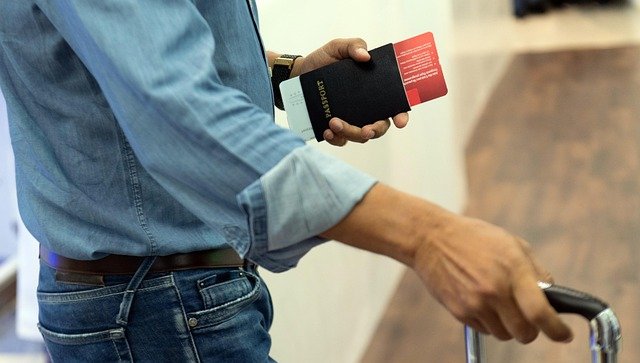Study Abroad: How to Travel Abroad with a Student Visa: Step-by-Step Guide for International Students.
- What is a Student Visa?
- Types of Student Visa.
- Step-by-Step Process to Apply for a Student Visa
- Choose Your Destination
- Apply to a School/University
- Prepare Documents
- Pay Application Fees
- Schedule a Visa Interview
- Attend the Interview
- Wait for Approval
- Common Mistakes to Avoid
- How to Prepare for Your Travel After Visa Approval
- Tips for a Smooth Journey as an International Student
Are you dreaming of studying abroad? The journey starts with getting your student visa approved. A student visa allows international students to live, study, or work in a foreign country without disturbance. If you are interested in studying in the United Kingdom, Australia, the United States of America, Canada, or any other destination, understanding the process will save you money, stress, and time.
Scholarjoiner has curated the best tips to walk you through everything you need about traveling abroad with a student visa, application requirements, interview tips, and traveling checklists. To make your international dream a reality, Scholarjoiner will guide you by the end of this post.
What is a Student Visa?
A student visa is an official endorsement on your passport that allows you to live in a foreign country for educational purposes. The government of the country you plan to study grants a student visa, which comes with specific rules like work limit, Travel permission, and length of stay.
A student visa allows you to stay for the duration of your study program and sometimes a little longer for practical training or job hunting.
For example, the Indian government does not allow international students to study and work. The international students studying in India are expected to return to their respective countries after staying 5 years there. Many European countries allow international students with a student visa to study and work. So, students planning to travel abroad must ensure they understand the country’s study policies and visa requirements.
Why a Student Visa is Important for Studying Abroad
Here are the major reasons why a student visa is essential for international students.
-
Legal Stay
A valid visa allows you to study, live, or work legally in your chosen country.
-
Peace Of Mind:
In some countries, students renew their visa yearly, and knowing they have legal status helps them focus on their studies.
-
Deportation:
A student with an expired visa might be deported or banned from entering the country for a period of years.
-
Work Opportunities:
Some countries allow students to study and work with their visa.
-
Access to Services:
Students may be eligible for health insurance, discounts, and local benefits.
Types of Student Visa.
Before applying for a student visa, it is important to understand the basic types of visas for countries.
United States of America (USA)
-
F-1 Visa
The F-1 visa is specifically for academic programs at tertiary institutions and colleges for international students.
-
J-1 Visa
The United States J-1 Visa is basically for exchange programs.
An exchange program is a type of educational program where international students study for a set period.
It is usually for a short period where students are still being enrolled in the home country college or University. Exchange programs are often one semester or one academic year. It’s a very short partnership program.
-
M-1 Visa
This type of visa is for vocational and technical training.
United Kingdom
-
Student Route (Tier 4)
This type of visa is essential for long-term academic studies.
Canada
-
Study Permit
A Canadian Study permit allows international students to study at a designated learning Institution.
Australia
-
Subclass 500
This type of visa covers all types of full-time study in Australia.
Requirements for a Student Visa
Before applying for a student visa, here are the basic requirements and details you need to know. Countries’ visa requirements may vary but most students’ visas need:
-
Admission or Acceptance Letter:
Before you apply for a student visa, make sure you receive an acceptable or an Admission Letter from your chosen school or University.
If you don’t want to waste your time and money, provide your acceptance letter to the immigration officer during the interview.
-
Proof Of Funds:
Many European countries require Proof of funds from international students.
The proof includes bank statements, sponsorship letters, or scholarship awards.
-
Valid International Passport:
International students are expected to have a valid passport at least six months beyond their stay.
-
Language Test Results
Some countries’ tertiary institutions require IELTS, TOEFL, PTE, or equivalent from international students.
-
Visa Application Form & Fees
Some countries allow applicants to apply for a visa online or in person. Make sure you fill out the necessary information and make the payment successfully.
-
Passport Photos
Attached are specific passport size and format requirements.
Step-by-Step Process to Apply for a Student Visa
Here is the list of step by step process of applying for a student visa.
-
Choose Your Destination
The first thing to do before applying for a student visa is to decide on the country and the Institution that best fits your educational goals.
Some students who study abroad don’t even research thoroughly about the country or Institution they are planning to join.
You need to plan your journey carefully so that you can choose countries and institutions that offer quality education and world-class degrees.
-
Apply to a School/University
After choosing the country and Institution of your choice, the next step is to obtain your official acceptance or Admission letter from your desired tertiary institution.
An Acceptance Letter will expedite your visa application process for faster approval. It shows the visa officer that your designated Institution accepted your application.
-
Prepare Documents
Before starting your visa application, gather all the necessary documents needed for the process.
Don’t make a mistake with your documents if you really want to get your visa approved.
-
Pay Application Fees
Make sure you pay for the visa application fees. Though visa payment varies by country.
-
Schedule a Visa Interview
Plan for Your Visa interview, countries like the USA make visa interviews mandatory, while some countries approve visas without an interview.
So, make sure you understand your chosen country’s visa interview requirements.
-
Attend the Interview
During the interview process answer questions clearly and honestly. Don’t lie to an officer because they are professionals in dealing with people like you.
Plan yourself a day or two days before the interview to boost your confidence and make sure to look smart.
-
Wait for Approval
After your interview, your visa application can get approved in days or months. So get patient while waiting for visa approval.
Common Mistakes to Avoid
Some visa applicants make terrible mistakes during their visa process. Here are the common mistakes to avoid.
-
Submitting incomplete applications.
Submitting an incomplete application can result in a visa being denied.
Make sure you bring all the required documents. Explain to the visa officer about any missing documents and seek a solution immediately.
-
Providing false or unclear information.
Providing false and unclear information about yourself or your financial capabilities renders credibility.
It is one of the easiest ways to deny someone a visa. Make sure to prepare yourself with the right information.
If there’s anything you don’t understand during the interview process you are allowed to ask the visa officer questions
-
Waiting until the last minute to apply.
Make sure to apply on time, as some countries approve visas on a first-come, first-served basis.
Your visa application approval depends solely on how you dedicate your time and resources to achieve your educational plans.
-
Not meeting financial proof requirements
Insufficient proof of funds can get your visa rejected.
Make sure you understand the basic requirements for proof of funds.
Every country has its funding requirements, which can be scholarship awards or a sponsorship letter.
How to Prepare for Your Travel After Visa Approval
When your visa is approved, here is the list of processes to prepare for your travel safely and comfortably.
-
Book Your Flight Early
Book your flight ticket early so that you can better price. Some airlines increase flight tickets closer to the departure date.
-
Pack Wisely
Bring all the necessary items, including academic documents, phone accessories like power banks, earphones, mobile phones, a laptop, and sweaters for the weather conditions.
Be ready for immigration checks.
-
Research the Airport Process:
Before travelling to the airport for your journey, understanding the basic airport requirements is necessary.
Flight attendance may reduce or request additional luggage fees. Some airlines have different packages for luggage.
Some allow 46 kg + plus 7kg while others allow 46kg × 2 + 7kg hand luggage. Choose the airline that fits your travel plans.
-
Arrange Accommodation
Make sure to arrange accommodation in a campus or off-campus environment before arriving.
Ensure that the distance between your institution and your house is not too far because of the cost of transport.
Tips for a Smooth Journey as an International Student
Here are the basic tips every international student must prepare for a smooth journey.
- Learn basic phrases in the local language.
It helps international students to interact with locals and helps them build strong relationships.
- Ensure to keep copies of all your important documents.
- Join student groups online before arriving at the institution.
- Respect local laws and culture.
In conclusion,
Traveling abroad with a student visa can take a lot of time, but with the right process, it becomes a rewarding journey towards your future. Your study abroad dream is closer than you think when you stay organized and patient.






